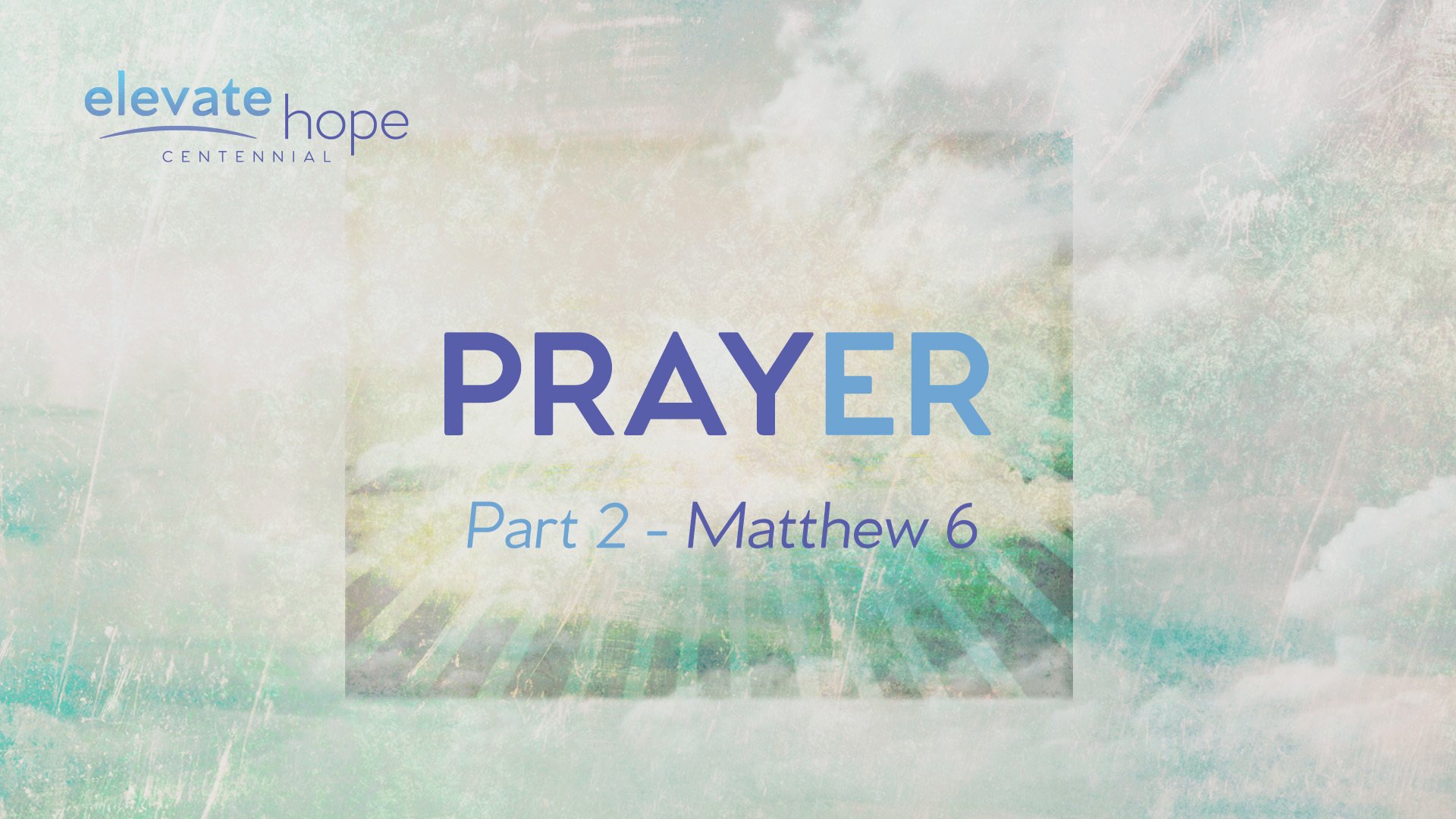Sermon Series
- Becoming the Gospel - 1 and 2 Thessalonians
- Building A Summer Body
- Building Healthier Relationships
- Disconnected
- Follow the Star
- Genesis: The Foundation
- God's Story
- Joy To The Troubled World
- Left Right or Light?
- Missing Home
- Our Motto and Mission
- Prayer
- Psalms: Language For Life The Way It Is
- Renewed
- Romans: The Power of the Gospel
- Ruth: The Advent of A Redeemer
- Seen
- Stuck Inside
- The Advent of Christ
- The Book of Acts: Live Boldly
- The Book of Daniel
- The Book of Ephesians
- The Book of James
- The Book of Jonah: Running Away From God
- The Book of Judges
- The Book of Malachi
- The Book of Matthew
- The Gospel of Mark: Seeing Jesus
- The Holy Spirit
- The Life You've Always Wanted
- The Miracles of Christmas
- The Secret To Healthy Relationships
- The Sin of Racism
- The Spiritual Life
- The Ten Commandments
- Thrive: A Summer Series
- Twenty Twenty What?
- We Need Christmas
- Who Am I?
- Why Pray?
Prayer Part 5 - Matthew 6
Most often, we treat prayer as the work of internal processing. We try to compose, sanitize, and spiritualize our thoughts before we turn them into prayer requests. Or worse yet, we have a conversation about our needs with ourselves first and only after do we talk to Jesus. But Jesus wants us to be external processors in prayer. To just start asking before we even know what we need or want, before we even know how to complete the sentence. He will begin to shape us, and even more joyous, He will bring us into fellowship with Him. In the last petition in the Lord’s Prayer, Jesus wants to teach us also how to pray in “real time” as temptation, trials, and evil unfold before us. This petition is one that is to be prayed both before difficulty arrives and also to be blurted out immediately as temptation strikes. In times of temptation, like all other times in prayer, we are to be external processors with our Father in prayer. Let’s look at this last petition in the Lord’s Prayer as we close out our series on prayer this morning.
Prayer Part 4 - Matthew 6
Can you think of a time when it was hard to ask for forgiveness, or hard to forgive someone? Our culture has a forgiveness problem, and my guess is that all of us struggle with forgiveness at times. We become super sensitive to all the ways others have hurt us and insensitive to the ways we hurt others. Even though the Bible says that Jesus has, “forgiven us all our trespasses, by canceling the record of debt that stood against us…nailing it to the cross,” we find it easier to cancel someone than to cancel their debt against us and do the long work of forgiveness. Jesus was often asked by his disciples about forgiveness. No one really asked, “Should I forgive someone?” But the question was, “What should be the LIMIT of my forgiveness?” Surely mercy has boundaries; the river of grace must have banks. And surely forgiveness should have its limit before someone doesn’t deserve to be forgiven anymore. Join us as we continue looking at the Lord’s Prayer in Matthew 6.
Prayer Part 3 - Matthew 6
Praying for daily bread can seem like a throwback to Biblical times. In modern times we have savings accounts, retirement funds, a spare car, a side hustle, and a plentitude of banks willing to loan us money for next year’s bread if we don’t have it today. But we as the modern church, the modern people of God, must somehow learn to pray this line. It’s part of Jesus’ answer to the disciples’ begging Him: “Teach us to pray.” Because no matter what century we live in, God does not help those who help themselves; He helps the helpless. Prayer happens when we realize we have no skill great enough to pull the strings of the cosmos. We have no education so great that it allows us to mine the depths of all wisdom. We are owed no wages for living for God and whenever we need something we only have to go to our Father and ask like a child. Let’s once again dive into The Lord’s Prayer.
Prayer Part 2 - Matthew 6
We are in a series on prayer, and this morning we are continuing to look at what is called the Lord’s Prayer in the the gospel of Matthew. When Jesus teaches His disciples to pray, He begins His prayer with “Our Father.” If we are going to pray like Jesus prays, He knows that we really need to understand fathers and what they are like. In fact, in both Matthew and Luke’s account of the Lord’s Prayer, Jesus follows the prayer with a story about a good father so that we can know what a good father is like. To address God as Father in prayer was not anything unique with Jesus; Jews often addressed God as “Our Father” in prayer. We see that in Isaiah 63 and other places in Scripture. What was unique about Jesus teaching us this prayer in response to the heart cry of “Teach us now to pray!” is that the one teaching us to pray “Our Father” is actually the true son of God. So, when the only begotten Son of the Father is asked about how to pray, His first thought is, “I want you to know that My Father is also your Father.”
Prayer Part 1 - Matthew 6
Since Jesus first taught the Lord’s prayer, it has been a comfort to many. It’s so simple that it’s been the prayer companion of children, and yet it’s a prayer that grows with our growth so that even the wisest and oldest of Christians would never dare to say they have mastered the treasures of wisdom it contains. The Lord’s prayer remains calm and even tempered throughout all the changing scenes of the past two thousand years, suited just as much for stained glass high church cathedrals as it is for an infant’s bedside. The Lord’s Prayer seems to anticipate every difficulty and danger, seems to answer every problem, and seems to offer every comfort to Christ’s disciples in every tribulation the world has known for the past two thousand years. Its petitions are serious and yet they bring a lightness to the heart when they are prayed. In spite of all the subtle and simple grandeur of this prayer, for some the Lord’s prayer is associated with things like penance or just vain repetition. But whether your heart shuts off or comes alive when you hear the Lord’s prayer, it remains how Jesus taught His disciples to pray when specifically asked.





